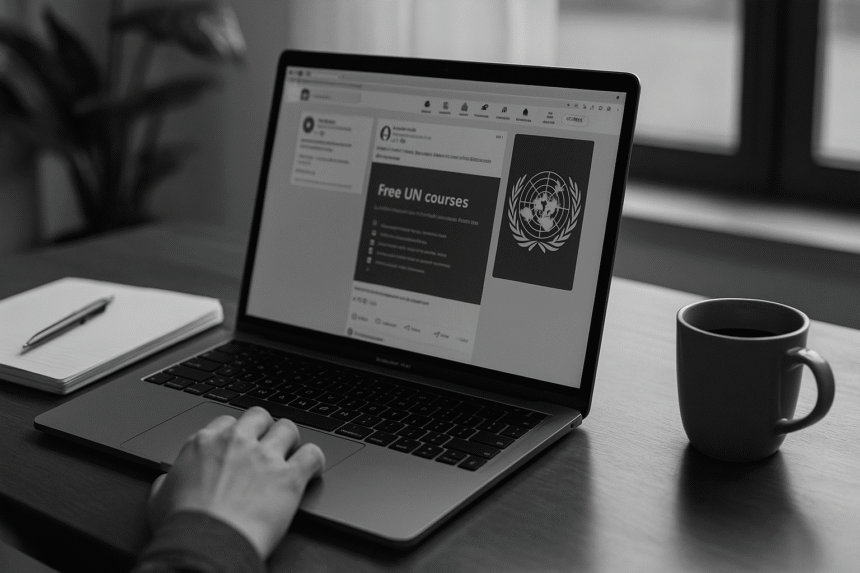Headline:
Unlocking Global Learning: What a LinkedIn Post on Free UN Sustainability Courses Reveals About Digital Inclusion in Sustainability
Subheadline:
A quiet post about free online sustainability courses sparked a wave of gratitude and sharing—reminding us how access, not cost, often defines opportunity.
Introduction (Lede Paragraph):
“Please share with your network who may benefit from these free courses.” With that simple line, Haiqi Wan—a Consultant at UNDP and IOM in Energy Affairs—sparked a ripple effect across LinkedIn. Her post, listing free sustainability courses offered by the United Nations, quietly gained traction. But what stood out wasn’t the content alone—it was how deeply people resonated with it. In a world flooded with paywalled learning and inaccessible certifications, this post struck a nerve.
Background & Context:
Haiqi Wan, who works at the intersection of energy policy and international development, is no stranger to complex sustainability initiatives. Based on her work with UN-affiliated bodies, her post carried quiet authority and relevance. The context? A curated list of 10 free, globally accessible UN sustainability courses on topics like food security, biodiversity, climate data, and sustainable tourism—offered to anyone with internet access.
What made the post timely was its combination of urgency and simplicity: at a time when global knowledge equity remains uneven, here was a rare list of high-quality educational resources—without a paywall, registration hassle, or institutional barrier. The outcomes? Dozens of comments thanking her. Hundreds of shares across networks. A digital breadcrumb trail of impact that helped amplify these UN Sustainability courses even further.
Main Takeaways / Observations:
1. Accessibility Is the Real Sustainability
This wasn’t a post about trendy ESG buzzwords—it was about removing entry barriers. By listing 10 UN sustainability courses available for free, Haiqi reminded professionals and learners alike that knowledge equity matters as much as policy. Access is a form of empowerment.
2. The Power of Curation
In a sea of noise, curated clarity is rare. Wan didn’t just share a generic link—she listed the course titles, added links, and grouped them under a unifying purpose. That’s what made the post shareable. It wasn’t self-promotional; it was practically useful. Her thoughtful approach helped spotlight these UN Sustainability courses as genuinely valuable, not just theoretically interesting.
3. Digital Literacy Isn’t a Given—But Sharing Helps Bridge It
The comments—many from educators, development professionals, and young learners—echoed one truth: people want to learn, they just don’t know where to start. A simple post on LinkedIn became a digital guidepost for many. It turned awareness of UN Sustainability courses into actionable access.
Community Reaction:
Dozens of comments poured in. Some from academic interpreters, others from nonprofit professionals and global students:
- “Thanks for sharing, Haiqi.”
- “These are fantastic resources—especially for our interns.”
- “Grateful for this list. Bookmarking it now!”
Some, like Delma Forokya and Chris Emmanuel, responded with appreciation. Others tagged peers or students. The response wasn’t viral—but it was deeply communal.
Our Perspective / Analysis:
As a legal and business advisor, I see this through another lens. What Wan’s post demonstrates isn’t just goodwill—it’s a micro-example of what public sector innovation looks like. The UN courses she shared touch on themes we negotiate in contracts and public-private partnerships daily: biodiversity metrics, urban development, agricultural strategy.
Legal teams often work with policy experts and clients who depend on accurate sustainability benchmarks. Having global frameworks like these courses available—and known—is a competitive advantage. It helps consultants, engineers, and corporate teams speak the same language across borders. In my own work advising PPP deals in waste, energy, and infrastructure, I’ve seen how alignment with UN SDG metrics can make or break compliance.
More broadly, the post affirms that information design and outreach can be just as impactful as the knowledge itself. If you’re in consulting or law, your value isn’t just in analysis—it’s in helping people access, understand, and apply.
Call to Reflection or Action (Closing):
What would change if more organizations—not just the UN—freely shared their best learning tools? If you’re a leader, how accessible is your expertise? If you’re a consultant, what resources have you curated lately—not for clients, but for your broader community?
Digital inclusion isn’t just about bandwidth or devices. It’s about intention. And sometimes, all it takes is a LinkedIn post with 10 honest links.



Leave a Reply